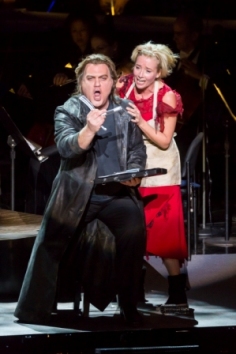Review: Sweeney Todd

Bryn Terfel and Emma Thompson in Sweeney Todd
(©NY Philharmonic)
The brilliant score of Sweeney Todd doesn’t lend itself well to minimalism, as the 2005 stripped-down Broadway revival of Stephen Sondheim’s classic well demonstrated. There were no such problems with the concert version recently performed by the New York Philharmonic featuring a stellar cast including opera singer Bryn Terfel as the Demon Barber of Fleet Street and, making her New York stage debut, Emma Thompson as his partner-in-crime Mrs. Lovett. The rich, powerful score has never sounded better, with the choral sections in particular providing no shortage of goose bumps. Those not lucky enough to have seen the show during its distressingly short run will be consoled by the knowledge that it was filmed for future broadcast on PBS’s Great Performances.
Hewing to the formula of his successful concert staging of Sondheim’s Company, director Lonny Price provides enough clever theatrical touches to make this far more than a mere recital. That’s evident from the ingenious opener, in which the entire cast troops onstage clad in formal clothing and assumes stiff positions behind music stands. As the music begins, it doesn’t take long for them to topple the stands to the ground, bust up several pieces of scenery, invert a grand piano, and tear off pieces of their clothing. This Sweeney Todd will clearly be no decorous affair.
That level of theatricality is not entirely sustained over the course of the evening, when the limitations of the staging fail to make the plot’s complexities fully comprehensible. But save for newcomers to the work, that’s hardly much of a problem. Its raison d’etre is to deliver the magnificence of the score, and in that it entirely succeeds.
Terfel’s booming bass-baritone voice infuses such numbers as “Ephiphany” and “My Friends” with a chilling ferocity. And though the singer doesn’t quite possess the actorly skills to fully delineate the character’s complexity, his menacingly powerful stage presence provides ample compensation. His Sweeney is perhaps the most frightening since Len Cariou in the original Broadway production.
There had been some advance trepidation about whether Thompson, whose sole previous musical credit was a stint in the 1985 West End production of Me and My Girl, would possess the sufficient vocal chops. But the actress, adopting a pitch-perfect Cockney accent, doesn’t disappoint. Her singing of the challenging score is clear and assured, and deeply moving in such numbers as “Not While I’m Around.” Not surprisingly, her delivery of songs like “The Worst Pies in London” and “A Little Priest” is infused with sublime comic flair. While her antic Mrs. Lovett is somewhat less down and dirty than some of her predecessors—she’s far more lovable than deranged—it’s a wonderful performance whose impact will only be magnified on the small screen.
The members of the ensemble are equally expert in their supporting roles: Jay Armstrong Johnson and Erin Mackey are affecting as the young lovers Anthony Hope and Johanna; Christian Borle is hilariously over-the-top as the rival Italian barber Pirelli; and Jeff Bllumencrantz is entertainingly weaselly as his cohort Beadle. Making his long overdue New York stage debut is three-time Oliver Award-winner Philip Quast, who brings unexpected dramatic shadings to the malevolent Judge Turpin. While lucky audiences at the first few performances were treated to the unannounced appearance of Audra McDonald as the beggar woman, Bryonha Marie Parham, who played the role on Saturday, was an able replacement.
But the true star of the evening is the glorious score featuring Jonathan Tunick’s intricate arrangements as superbly rendered by the 52-member orchestra conducted by Alan Gilbert. Such numbers as “The Ballad of Sweeney Todd” (unforgivably excised from Tim Burton’s ill-conceived movie adaptation) and “City on Fire” register with such a visceral ferocity that the deafening air horn blasts at key dramatic moments seem entirely redundant.
Avery Fisher Hall, Lincoln Center
| Print article | This entry was posted by Frank on 03/10/14 at 08:23:24 am . Follow any responses to this post through RSS 2.0. |